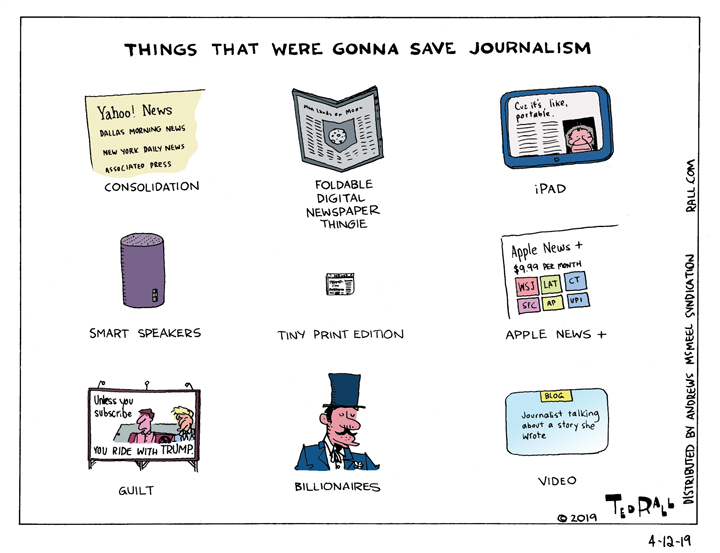Since the newspapers that generate over 90% of the news began tanking in the 1990s, we have repeatedly been told that some magic bullet, usually technological but not always, was going to save the industry.
Things That Were Going to Save Journalism

Ted Rall
Ted Rall is a syndicated political cartoonist for Andrews McMeel Syndication, WhoWhatWhy.org and Counterpoint. He is a frequent contributor to The Wall Street Journal, a graphic novelist and author of many books of art and prose, and an occasional war correspondent. He is, recently, the author of the graphic novel "The Stringer."

4 Comments. Leave new
But Ted, haven’t people like Keith Rupert Murdoch and Jeffrey Preston Bezos, while overcoming the trials and tribulations of their private lives, saved journalism ? As exemplified by Fox News and the WaPo (for obvious reasons I abstain here from mentioning the Los Angeles Times) ?…
Henri
I recall the whole “tech will enhance” the news thing. And for a while, it did. Hard to believe, but the day that any particular newspaper went to color on the front page was usually a story in the paper itself.
The technology killed the papers in the same way that a Ginsu knife takes off the inexperienced fingers of distracted cooks. The tech guys sold people who were rich and naive (about tech) a bunch of things that would make them depend on more tech forever and ever. Sure, html and content management systems and email delivery and so forth will save a bundle for the publishers and owners. But they wouldn’t replace the huge ad revenues.
And look at all those ads on the internet. Has anyone ever explained where all those shitty ads come from? I mean, who cobbles them together? Who actually clicks to find out about those six weird tricks the government doesn’t want you to know about? Who actually buys those products offered? A few sites keep those ads off, but more and more sites seem to just go to Google ads and throw some code provided by them onto the home page template. I don’t think any humans actually look at those ads, just programmed bots. (So, in a way, it’s tulip mania all over, and what a sound it’ll make when that bubble pops.)
The internet makes the end product dirt cheap to distribute, but it doesn’t reduce the cost of production down to dirt cheap. So a story that someone with 10 years of experience worked on for three weeks and took two additional weeks to hammer into shape (and which needed copyediting and photos) can be copied in toto and distributed worldwide in under 10 seconds by some Millennial who thinks information should be free, man, as he sits in a coffee shop spending his parents’ money on a $7 cup of authentic coffee. (I notice the Millennials seem to be self-eliminating the douchier aspects of their cohort as they come to realize that those rich poseurs in the ridiculous beards who choose to not go find a job aren’t Millennials after all. They’re just douchebags.)
I don’t know that the papers could have saved themselves. I think that an evolved form, something like a local biweekly, filled with long-form useful articles, with an internet presence that offers only the archived editions (thus, the April 2019 website would offer up to February 2019), may end up being the model that survives. But the internet is like a woodchipper. It’s great for a very small number of specific things, and absolutely destructive for everything else: grinding up a tree? Great. Washing the dishes? Not so great. Getting rid of a body? Great. Exfoliating? Well, technically, great, but in a real-world sense? Not so great.
Excuse me for a stained metaphor. Rich folks are not ‘job creators’ – it’s demand that creates jobs.
In the same way, journalism needs a demand. If “we” wanted it bad enough, we’d have it. The ‘Trump Bump’ helped, the scare over fake news reminded people that there is some value to hearing slightly-less biased news.
When the market for frogs’ legs dried up, there was no amount of marketing or cash infusion which would save it*. Is journalism going the same way, or will we wise up? “Enquiring minds want to know”
* I warned you about a strained metaphor 😉
Ted, how about a follow-up: Nine-X pictogram of the causes why journalism found itself in the position of having to be saved?